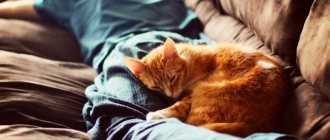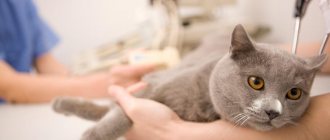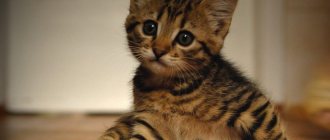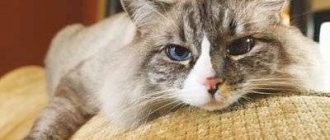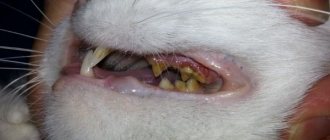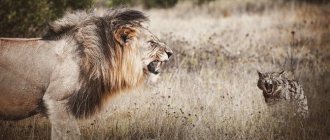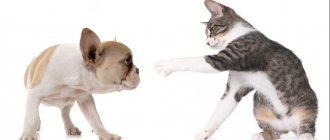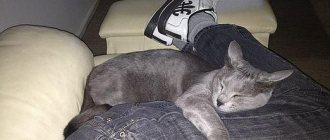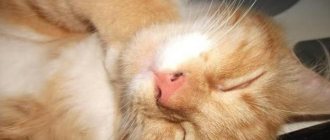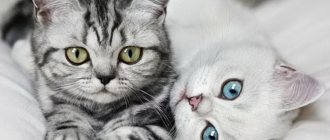What is this phenomenon?
If a cat constantly asks for food, then this change in eating behavior is called polyphagia. This is a pathological condition caused by:
- gluttony and stretching of the stomach walls;
- lack of nutrients during the active growth of a young animal;
- the body's reaction to medications;
- stress or prolonged feeling of discomfort;
- cold season;
- decreased metabolism in old age.
- I’m hungry!.. Polyphagia can develop at any age.
If your cat has been eating a lot lately, although this was unusual for him before, the reason should be identified as soon as possible. Attention! Stressful situations and prolonged lack of appetite subsequently provoke polyphagia in cats. After a hunger strike, they try to make up for the lack of nutrients without feeling full.
Symptomatic treatment
Of course, your pet’s appetite is too good – no reason to worry. If overeating is not typical for a cat in general, the animal should be observed for several days. If polyphagia progresses, the cat should be shown to a specialist.
In addition, the following facts should be of concern:
- The cat eats a lot and constantly asks for more food over a long period of time (a week or more). At the same time, overeating began suddenly.
- The distribution of fat deposits is uneven. For example, a clearly visible fat belt forms in the abdominal area.
- The cat eats a lot, but at the same time loses weight, losing weight literally before our eyes.
- Weight gains too quickly, the animal loses shape, becomes lazy and apathetic.
- The animal ceases to be interested in absolutely everything except food.
- The cat changes in behavior: it becomes irritable or lethargic, too affectionate or, on the contrary, tries to hide from people.
- Vomiting or diarrhea appears after eating.
How to properly feed a cat natural food?
The menu consists of two types of dishes. These are meat and dairy products.
The basis of the meat diet is lean beef, cut into small pieces. Next you need to provide the dish with vitamins. This can be done with the help of vegetables or special additives. Veterinary stores sell vitamin powders that contain everything your pet needs. The compositions are not cheap, but it saves the housewife time.
The fermented milk set consists of low-fat cottage cheese and one percent kefir. On average, cottage cheese is served “on the table” to the cat 1-2 times a week.
Symptomatic diet and procedures
Whatever the cause of polyphagia, it is important to monitor your cat's diet and lifestyle.
For example, an animal’s daily diet should include porridge, fermented milk products, grass, and stewed vegetables.
You should not give your cat food if he is full. Overeating is often provoked by the breeders themselves, fulfilling all the wishes of the pet.
It's also helpful to remember that we have pets for more than just feeding them and cleaning up the litter box. You need to communicate and play with the animal, pet it, “scratch it behind the ear.”
If the cat has had to endure stress, it is necessary to compensate for the loss of positive emotions. But this cannot be done with the most delicious food. You can calm your animal with herbal sedatives (but don’t forget to consult your veterinarian first).
If the cause of overeating is illness, it is important to replenish the loss of important microelements and vitamins. For this, veterinarians recommend using special supplements and vitamin complexes. They will help the animal recover faster and also strengthen the immune system.
When is there nothing to worry about?
All of the listed symptoms of cat gluttony are removable and should not cause concern to owners unless severe exhaustion/obesity, vomiting after eating, or deterioration in the condition of the coat and teeth are observed. Polyphagia can be overcome by properly organizing the feeding of the purring cat.
During the period of active growth and development, which lasts about 2 years, kittens have a great need for nutritious, balanced food. They spend a lot of energy and try to replenish it by eating more than normal. If the kitten eats a lot, grows quickly and remains energetic and playful, then there is nothing to worry about.
Babies need a lot of energy
Peculiarities of eating behavior also depend on the breed, so owners should be aware of their cat’s daily calorie requirement, as well as how this parameter changes depending on the pet’s age.
Female felines may experience an increased appetite after the end of estrus, when they try hard to make up for the lack of calories by eating. During heat, a cat completely loses its appetite due to nervousness, but subsequently they simply eat up, absorbing food in unlimited quantities.
Attention! Older cats show more interest in food than young cats. An active, non-obese pet with a slightly increased appetite should not cause concern.
The cat constantly wants to eat during pregnancy and feeding
A female cat bears babies for an average of nine weeks. Any deviations from the given norm in one direction or the other are quite acceptable and depend on: breed, physical activity, physiological state. If the female cannot give birth after the seventieth day, you should immediately consult a doctor.
It is noteworthy that at the very beginning of pregnancy, the animal, on the contrary, begins to eat less; this is most likely due to toxicosis.
Increased appetite occurs around the fourth week of pregnancy, although this is not a categorical statement. For each individual individual, the process occurs purely individually. In this case, it is recommended to switch the female to ready-made food designed specifically for pregnant cats. It contains the entire complex of useful substances required in such cases.
It is recommended to feed a pregnant cat with special food containing beneficial substances.
About the same thing happens when feeding kittens. The mother's appetite depends on the number of offspring, as well as on the amount of milk. A ready-made balanced special food will eliminate the problem.
How much should a kitten, adult and elderly animal normally eat?
Kittens require food for growth and normal development, and mature animals need food to maintain normal weight. With the onset of old age, cats begin to lose weight because they can no longer eat in the same quantities and do not need large portions. Feeding rates for felines depend on the type of food. Information on the approximate daily amount of dry and wet food required by a kitten:
| Type of feed | Pet's age, months | Daily amount of food, g | |
| Minimum | Maximum | ||
| Dry | 1–2 | 30 | 50 |
| 2–4 | 40 | 65 | |
| 4–6 | 55 | 70 | |
| More than 6 | 60 | 80 | |
| Wet | 170 | 210 | |
| 210 | 300 | ||
| 170 | 255 | ||
Information on the daily requirement of an adult cat for natural food, dry and wet food:
| Type of feed | Animal weight, kg | Daily dose of food, g | |||
| Dry | 3 | 45 | |||
| 4 | 55 | ||||
| 5 | 65 | ||||
| More than 6 | 12 g of product per kilogram of animal body weight | ||||
| Wet | 3 | 190–200 | |||
| 4 | 230–240 | ||||
| 5 | 250–260 | ||||
| More than 6 | 300 | ||||
| Natural | Meat and offal | Cereals | Vegetables | Fermented milk products | |
| 3 | 80 | 45 | 10–15 | 70 | |
| 4 | 100 | 60 | 20–30 | 80 | |
| 5 | 125 | 75 | 25–35 | 100 | |
| More than 6 | 150 | 90 | 30–40 | 130 | |
Pathological causes
There are also pathological reasons why a cat eats a lot and does not get enough, signaling serious changes in the body. This:
- impaired absorption of beneficial components due to congenital characteristics of the body or the presence of serious diseases - inflammation and intestinal cancer, exocrine insufficiency, pancreatic tumors;
- diabetes mellitus, which often affects pets;
- pregnancy and breastfeeding;
- helminthic infestation.
If the cat's constant hunger is not associated with pregnancy and worms, it requires specialized veterinary care. The presence of serious diseases affects the appearance of the animal - the cat eats a lot, but loses weight, becomes capricious, loses interest in active games, and its fur and teeth become unattractive.
It may be worth contacting a veterinarian
As a rule, most diseases respond well to treatment and require a balanced diet using special foods. You can detect the presence of the disease yourself, simply by observing your pet: the fact that the cat is always hungry, drinks a lot and often goes to the toilet indicates diabetes.
Problems with the gastrointestinal tract are indicated by vomiting and diarrhea. Of course, only a doctor can prescribe treatment!
A brief description of diseases whose symptom is a constant feeling of hunger.
A constant feeling of hunger in animals is called polyphagia.
If, in addition to your pet's appetite for food, there are other warning signs, such as weight loss or vomiting after eating, you should seek help from an experienced veterinarian.
Roundworms.
Roundworms are a common disease caused by parasites that live in the digestive system of cats. After infection, parasites take nutrients from food, which causes the animal to constantly feel hungry.
Diabetes.
When a cat's body does not produce enough insulin to maintain glucose or blood sugar levels, the condition is called diabetes. One of the consequences is a constant desire to eat, as sugar levels can change dramatically.
Acromegaly.
An endocrine disorder that causes excess production of growth hormones by the pituitary gland. With the overproduction of such hormones, the cat eats very often.
With this disease, the pancreas does not produce the digestive enzymes necessary for the cat to digest food.
A general name for many gastrointestinal diseases, some of which are chronic. They are caused by the appearance of inflammatory cells in the thick walls of the gastrointestinal tract, which interferes with the proper functioning of the cat's digestive system.
READ Detailed description of river carp and its species
Tumors, both malignant and benign, can cause insulin levels to rise, which increases the production of growth hormone. Tumors can prevent the proper absorption of nutrients from food. In the later stages of cancer, cats lose their appetite.
Infections.
Some infectious diseases to which cats are susceptible lead to nutrient deficiencies or insufficient absorption of nutrients by the body. This can cause your cat to feel constantly hungry.
A side effect of using medications such as steroids in cats can be increased appetite. If your cat constantly asks for food, discuss this with your veterinarian. Changing the medication usually normalizes the behavior.
Hyperthyroidism.
A thyroid disorder known as hyperthyroidism (or hyperthyroidism) can lead to increased appetite. This occurs due to an increase in the concentration in the blood of specific hormones produced by the thyroid gland.
If a cat is bored, anxious or depressed, it will try to become comfortable using a variety of methods. One of these ways is to search for food. Often the presence of psychological problems leads to other changes in behavior - damage to furniture, aggressiveness, and so on.
When a cat is deficient in certain nutrients, it may eat more to make up for the deficiency. Sometimes your cat will start eating unusual things, such as litter or dirt. She may also drink more than usual.
When is it necessary to consult a veterinarian?
It is recommended to show your pet to a veterinarian if:
- he feels sick and vomits;
- the animal meows pitifully, which indicates that something hurts;
- the cat's body temperature has increased;
- poor digestion (diarrhea or constipation);
- the cat has become lethargic, moves little, does not respond to external stimuli;
- despite an increase in appetite, he rapidly loses weight;
- The cat's fur has lost its shine, has become tangled and is falling out.
Share with friends!
What to do?
If the cat asks to eat more than the norm, then you can:
- change the food to a more expensive and nutritious one. Cheap economy class mixtures do not contain the vitamins, minerals, and biologically active substances necessary for normal growth and development of the animal. Their deficiency in the cat’s body provokes overeating;
- do not feed in excess of the norm, focusing on the instructions for consuming food, the age and physiological characteristics of the cat;
- organize fractional feeding at the same time - 2-3 times a day;
- eliminate unscheduled snacks that are skillfully begged for by cunning manipulative cats.
A pregnant cat must be fed with specially formulated food that contains the full range of essential nutritional components or the diet must be further enriched with vitamins and minerals. As a preventive measure and to get rid of parasites, regularly administer anthelmintic drugs.
Diabetes mellitus and intestinal diseases require diagnosis and drug treatment. You should also contact a veterinarian if, despite all efforts, the cat constantly asks for food, and its appearance leaves much to be desired.
Prevention.
The first step is to provide your cat with a well-balanced diet. If you are sure that your cat is getting enough food and water, but still shows a feeling of hunger, you need to contact your veterinarian - she may have health problems. Early diagnosis of diseases will prevent more serious problems.
Although many diseases are difficult to treat, their timely detection improves the prognosis of recovery. Regular visits to the veterinarian will help keep your cat in good health. Some diseases are successfully and quickly treated in the early stages, leaving no consequences.
READ Gamavit for cats purpose, benefits and methods of use
Diabetes
In diabetes mellitus, nutrients are not absorbed in the body, which causes energy deficiency.
The disease is characterized by the development of metabolic pathologies that provoke absolute or relative insulin deficiency. As a result of such a disease, metabolic processes of all systems are disrupted. There is a failure of carbohydrate, fat, protein, mineral and water-salt balance.
We invite you to familiarize yourself with: Breeds of black cats. Photo and description
Despite the efforts of the owners and the good diet of the animal, nutrients cannot be absorbed into the body, since a lack of glucose provokes an energy deficit for this process. And glucose itself is absorbed only with insulin, which is not enough as a result of a failure of metabolic processes.
Symptoms
One of the symptoms of diabetes is constant thirst.
- With excessive appetite, the pet sharply loses weight, and the amount of urine output increases.
- Peripheral neuropathy manifests itself - the animal walks, leaning on the entire foot, the gait is uncertain, unsteady.
- The cat becomes weak, lethargic, and reluctant to make contact.
- The smell of acetone is felt from the oral cavity, the skin becomes thinner, the coat is disheveled, dull, a sickly appearance and a dull look.
Treatment
A properly selected diet is the key to successful treatment of a cat.
It is recommended for pets who have recovered from this diet to remain on this diet for the rest of their lives. Sugar-lowering tablets and insulin injections are used.
If diabetes is suspected, the owner can independently check the sugar level. To do this, you will need to conduct a test using special urine strips. It is also possible to use a veterinary glucose meter to check your blood sugar levels. The physiological indicator of sugar in the urine is its absence. In the blood - from 3.3 to 6 mmol/l.
Why does a male cat continue to scream after castration or sterilization?
Castration or sterilization is the optimal solution to the problem of a pet’s nightly cries if they are associated with sexual instinct. The best age for an animal to undergo surgery is 1 year. If you spay or neuter your pet later, the behavioral skills may become fixed and the cat will continue to yell out of habit. The first week after castration, the animal continues to scream in search of a partner, because it takes time for hormonal levels to change.
If enough time has passed after castration or sterilization, and the pet still continues to organize nightly concerts, the veterinarian may have performed the operation poorly. Sometimes some of the gonads remain in the body, and they produce hormones that awaken the sexual instinct. If you suspect this state of affairs, you should contact a veterinary clinic.
For what reasons does a cat constantly ask for food?
Moreover, our cat does not get fat no matter how much he eats. And in between meals, he catches flies and other evil spirits flying through the balcony.maximus Posts: 37 Registered: Apr 03, 2021, 01:46
Natalia » 06 Jul 2021, 07:20
In any case, once a quarter the animal should be given prophylactic drugs against helminths, and the food should be chosen as industrial food; it is advisable to introduce vitamin supplements necessary for the cat’s body into the diet (if you feed it with homemade food). But it’s easier to take premium industrial food and feed according to the recommendations on the packaging. Natalia Messages: 3 Registered: 11 Feb 2021, 15:07
What to do if your cat starts eating a lot
Now let’s look at what to do if an animal is overly hungry.
If your pet begins to ask to eat more often, and the amount of food eaten has become larger, then first of all you should pay attention to the balance of the food. Perhaps it's time to change the food to something more nutritious. But you don’t need to get carried away and give your cat food in excess of the norm.
It is also necessary to exclude all possible pathologies described above, and carry out treatment for fleas and worms.
Young and growing animals can be fed more than usual
Since cats love to eat delicious food, it is important for the owner to feed the pet in such a way that its body replenishes energy in a timely and efficient manner. Then it will be easier to understand when the cat gets sick and his eating behavior changes.
The normal weight of a cat is between 3.5 and 5 kg. It all depends on the breed. Cats of different origins differ in activity, dynamics and metabolism. In adulthood, the individual reaches 7-8 kg. You can find out why a cat doesn’t get fat if you understand how nutrition affects your pet’s body.
When a cat is thin and does not gain weight, but eats a lot, this does not mean that the pet is sick. If an animal spends its days running and jumping around the apartment or on the street, losing weight and not gaining weight becomes a good sign. The body consumes the energy received from food, the digestive system develops and functions in a stable manner.
Other reasons for losing weight include:
- A cat cannot gain weight after giving birth . If there are more than 2 kittens in the litter, you should not count on rapid weight restoration. Carrying out such a brood takes a lot of effort and energy. Therefore, mother cats will need time.
- Males begin to lose weight during the period of sexual heat, as do females . In spring, the body of cats and dogs is especially active. Castration will help: sterilized cats simply have nothing to do, so such animals gain weight instantly.
- Pets are not adapted to stressful situations and therefore do not gain weight . Street cats are constantly under threat. An uninvited guest, a new pet in the apartment, or even a newborn baby can shock a furry animal. Refusal to eat is a natural reaction.
- If the cat eats well and does not get better, the problem may be a helminthic infestation . Helminths enter the body through the dirty hands of the owners, an unwashed tray, and dirty water. It is better to start treatment immediately: the period of getting rid of worms can last up to six months.
- It is useless to feed old cats heavily . With age, the activity of females and males decreases. Cats spend more and more time lying down and moving little. This does not indicate illness: the cat will not eat more than the body needs.
- Vitamin deficiency leads to weight loss . Industrial feed will correct the situation. Artificial formulations (available in dry and liquid forms) contain mineral supplements and restore the balance of beneficial components in the body.
If the kitten has a voracious appetite
There may be more than one reason why a cat eats a lot. The most harmless of them include:
- pregnancy;
- feeding babies;
- cold snap;
- physical exercise;
- growing young organism;
- sterilization or castration;
- experienced stress, which may arise due to a change of place of residence or owner, as well as the appearance of a child or another animal in the apartment.
But also the fact that the cat began to eat a lot can be caused by the presence of various diseases, the most dangerous of which include:
- diabetes;
- worms;
- poor quality food;
- a brain tumor;
- liver diseases;
- intestinal problems.
Now let's talk about the above problems in more detail.
When cold weather sets in, the animal begins to accumulate subcutaneous fat in order not to freeze, so it eats a lot. However, in winter it moves less, because in this case the pet is at risk of obesity, which also harms its body.
If you decide to spay or neuter your male dog, then you need to be prepared for the fact that your pet will eat more. This happens due to the fact that their healthy interest in the opposite sex changes to an irresistible interest in food and the pet eats a lot.
Physical activity also constantly increases the Murka's appetite, because it quickly uses up energy, which somehow needs to be restored.
Naturally, there is nothing wrong if young kittens start asking for more food, as they need to gain strength.
She can eat a large bowl 6 times a day, we try to wean her off (guests say the cat has become fat), but she starts meowing in a terrible voice throughout the apartment without stopping, annoying everyone at home, she even locked her in the bathroom for a couple of minutes. I do not know what to do.
Newborn kittens keep up with their older kittens and spend 90% of the first days of their lives sleeping. But such a long sleep plays an important role in the further development of the kitten.
It is very simple to explain why a kitten sleeps constantly - sleep is just as important for a newborn kitten as it is for a small child. During sleep, a kitten's organ systems develop at a faster pace, and the body as a whole gains strength. In addition, it is during sleep that the hormones necessary for growth are produced.
It’s a completely different matter if an already grown kitten sleeps all day. This shouldn’t happen, since by about two months of age, the kitten’s sleep normalizes, and the number of hours of sleep approaches the amount of sleep of an adult cat.
Passive behavior may be one of the signs of the manifestation of a disease. It is worth taking a closer look at the condition of the kitten’s body. In addition to drowsiness, a clear sign of the onset of the disease is loose stools.
Have you noticed that the cat licks its fur in an unusual way?
This problem often concerns castrated animals, which, due to hormonal changes, actually have an increased appetite. This is usually a temporary phenomenon, and it goes away as soon as the cat’s body adapts to its new state.
If your tailed pet is overweight and asks for more, this indicates that the cat has a stretched stomach and needs more food to be satisfied. In this case, you will need the help of a veterinarian, since it is not so easy to put an overweight cat on a diet.
Sometimes the normal process of grooming becomes obsessive. This excessive licking is a signal that there is a problem.
Licking that causes excessive hairball regurgitation or even balding skin is abnormal. The skin is exposed to sunburn, hypothermia and other adverse environmental influences. Intact skin is resistant to infection. If a cat licks its fur to such an extent that it breaks the integrity of the skin with its rough tongue, infection may occur in these places.
The infection, in turn, increases the intensity of licking. Thus, a vicious circle of “infection-licking” is formed. It can be broken only by identifying and eliminating the original cause. The owner can check for the presence of parasites (fleas, lice, etc.) in the cat's fur; in addition, consultation with a veterinarian is necessary.
If your cat licks its fur too often or for too long, do not ignore this fact. A cat can lick itself to such an extent that there is no hair left on the skin. Usually, owners notice that the cat licks its fur too often when bald spots appear on the stomach and other easily accessible places on the body.
According to Doctor of Veterinary Medicine (DVM) Pamela Perry of Cornell University's Animal Behavior Clinic, the average cat spends 30 to 50 percent of its grooming time grooming. This is quite a lot, so owners do not pay attention to the problem until they notice significant hair loss or even skin damage.
We suggest you read: What to feed a red-eared turtle at home
Allergy to food
One reason may be an allergic reaction to food. For example, dry food may contain plants that cats do not naturally eat.
Physiological changes and appetite
An insatiable appetite in kittens and young cats is considered normal. A growing body requires food and this is absolutely normal. Typically, kittens have several growth phases during which their appetite increases rapidly. This occurs at approximately 3, 6 and 9 months. Such changes are usually short-term and last no more than two weeks, after which the appetite returns to normal.
If a cat suddenly begins to eat a lot during the cold season, this indicates that the animal is constantly freezing. This phenomenon is observed in thin cats and young animals that have only recently stopped growing and have not yet gained enough subcutaneous fat to protect them from frost. You can help an animal during the cold season with the help of simple improvised means - pillows, blankets and heaters. It is necessary to equip the cat with a special warm place in which it would be safe and not freeze. For this purpose, special beds, baskets and houses for cats, designed for cold climates, are suitable.
Quite often, an increase in appetite is observed when moving to places with a different climate, more humid or cold. Until the animal’s body adapts to the changed weather conditions, the pet will constantly experience hunger. This is an absolutely natural reaction that should not cause concern to owners.
Physiological reasons for increasing food volume
If a cat is expecting offspring, her body requires slightly more food. Her appetite increases. This is normal. She should not eat 2 times more food, but the quantity should be increased.
After spaying and neutering surgery, cats may eat slightly more than usual. This should not be allowed. You can feed your pet for some time with food specially created for this purpose. Over time, his behavior normalizes.
A cat can store fat if the room where it is kept is cool. When it gets cold, animals, like people, begin to eat more in order to accumulate a layer of fat that protects them from the cold.
Older cats can sometimes overeat. Considering that older pets are no longer as active as their young counterparts, they may actively begin to gain weight. This cannot be allowed. If the animal is healthy, it must be fed according to the norms.
We invite you to familiarize yourself with: Decorative Angora rabbit mating
If an animal has not eaten for a long time for some reason, it may attack the food and eat more food than its stomach can accommodate and process. In this case, the cat may vomit the “extra” food. This is a one-time phenomenon and will not be repeated every day.
Hunger
A hungry cat makes sounds that sound like a baby crying. In this case, eliminating the cause of this behavior is quite easy; you just need to feed the animal. Often kittens cry due to malnutrition. They often feel hungry because their growing bodies require nutrients. Owners need to learn the rules for creating a cat menu and feed their pet on time. Sometimes owners mistakenly believe that they are giving the animal enough food.
However, there are times when a cat has just eaten, but runs around the table with human food and screams. “Why does the cat meow for no reason?” — this is the question the animal owners ask. This can be explained by the fact that pets are very gluttonous. Cats may beg for food when they smell delicious smells. In this case, you should not follow the animal’s lead. The pet should be taught to eat at strictly defined hours.
Cats often meow when their owners frequently change the types of food they eat. After all, the pet’s body gets used to certain foods. It is especially undesirable to alternate the intake of dry ready-made food and food from the human table. This can lead to digestive problems.
Why does a little kitten constantly meow? The most common reason for this behavior is... hunger! This is how your new family member will show what he wants to eat.
This phenomenon is quite normal. After all, when a person is hungry, he talks about it. So the animals do the same. Only instead of the speech we are used to, the cute fluffies meow.
Please note: a small kitten will constantly ask its owner to feed it while it is hungry. But adult cats try to meow clearly and only a few times, as if to call their owner to the bowl. Thus, due to hunger, all animals vocalize. It doesn't matter at what age.
Should I restrict my pet's food?
What to do if your furry pet has an increased appetite? If the cat tries to get an additional portion of food, you need to go to the veterinarian for consultation. Based on some tests, a specialist must exclude possible diseases.
The fact is that cheap food does not contain enough nutrients. It is for this reason that most often pets are hungry. If the animal does not have problems with excess weight, you can not limit its food intake, provided that the furry pet does not have diseases.
To avoid cat obesity, the food bowl should not be available all the time. This is due to the fact that it is very difficult for cats to stop at the sight of food. Regular overeating is fraught with serious diseases, as a result of which cats cease to feel full and the cat constantly wants to eat. Feed the animal no more than three times a day; a bowl of clean water should be constantly in sight of the animal.
Of course, there are situations when a cat eats a lot and few owners ask themselves the question why the cat began to eat a lot? Some owners are even happy that their pet finally has a good appetite. And very rarely the owner tries to deal with this situation and help the animal somehow get rid of the problems.
Finding a toilet
A small animal may scream in confusion, not knowing where to relieve itself. In such cases, you should put him in a tray and, if possible, explain why this device is needed. Even if the kitten is accustomed to the tray, in a new place he may not understand what this piece of furniture is for, so it is necessary to show it. By the third or fourth time, the animal will definitely understand the purpose and location of the toilet. In some cases, once is enough.
If a kitten comes to a new home at a very early age (up to a month), it may be in pain if it wants to go to the toilet. The fact is that a cat constantly licks newborn kittens, and this action has different purposes. Mom doesn't wash the babies as much as she massages them. This stimulates the kitten's still weak intestinal peristalsis. In such cases, the owner needs to gently massage the pet’s tummy, starting the process of defecation.
Other classifications
According to the age
Cat cries are often caused by age. For example, little kittens, like children, love to complain about various difficulties and obstacles that they encounter on their way - cute fluffy balls show their anxiety by meowing
However, sometimes reasons are not needed: a baby may utter a battle cry just to attract the attention of its owners - this is a completely normal phenomenon. The owners of a kitten should be wary only if the baby cries constantly - then it is worth identifying the cause of concern as quickly as possible and eliminating it
The most common causes of loud screaming in kittens are the following.
Change of environment - when a kitten finds itself in a new family or in a new home, it is always stressful for him. In this situation, the owner should surround the baby with affection, and his anxiety will quickly pass.
Hunger – young kittens require more frequent feeding than older cats
Depending on the return, he must eat from 4 to 7 times a day, so it is important that the feeder is constantly filled, and that there is free access to water.
Difficult situation - often inquisitive kittens, in their attempts to explore their surroundings, find themselves in a difficult situation, for example, they climb onto a high place from which they cannot come down. In this case, they call their owners for help with a loud meow.
Problems occur not only in babies, but also in older cats. Unfortunately, age does not spare anyone - not only people, but also animals.
When a cat crosses the five-six year mark, it is best to regularly show it to the veterinarian so that if illness occurs, measures can be immediately taken to alleviate the animal’s condition.
In addition, older cats often experience real melancholy, feel loneliness and try in every possible way to get rid of this feeling. At this age they will no longer play, but they are unlikely to refuse to lie in the arms of their owner. You shouldn’t deny them this simple sign of attention - if you don’t give your cat the necessary portion of love and affection during the day, she will certainly demand her own at night.
By gender
A loud cry is accompanied by the approach of estrus in an adult, sexually mature cat, and in cats, sexual desire causes uterine cries
A physical desire that is not satisfied brings the animal not only psychological, but also severe physical discomfort - by screaming, pets try to attract the attention of the opposite sex, signaling their readiness to mate
When adopting a kitten, you should keep in mind that if the animal is not on a walk, then such concerts will be held regularly, and the owners will either have to come to terms with this or spay/neuter their furry pet.
Reasons for cat night concerts
Why does a cat meow for no reason at night? This often occurs in animals during estrus. Continuous screams at night may also indicate illness.
However, most often a cat screams at night because it cannot sleep. It is possible that her sleep-wake pattern is disrupted. Night meowing greatly disturbs the peace of the owners. In this case, you need to make sure that the cat sleeps as little as possible during the daytime. It is also useful to arrange active games with the animal more often during the day. This will ensure your pet sleeps soundly at night.
Refusal to eat, water and play is a symptom of internal organ pathology
If the cat is lethargic, does not eat or drink, and does not want to play, the cause may be a disease of the internal organs. Diseases of the digestive system (gastritis, colitis, pancreatitis, stomach ulcers) are manifested by upset stools, flatulence, mucus or blood in the stool, and sometimes an increase in temperature. The cat often burps, licks its lips (this happens due to nausea), and often has a gag reflex.
Similar symptoms are characteristic of obstruction of the digestive tract, which may be caused by a foreign body. A kitten or adult with sensitive digestion may refuse food and water due to stomach upset, which can be caused by feeding errors or changes in diet, such as switching from natural food to dry food and vice versa.
Urolithiasis is characterized by the formation of stones in the organs of the genitourinary system, which makes it difficult for the outflow of urine. During an exacerbation, the cat experiences severe pain, urination is difficult, and blood appears in the urine. He practically does not get up, does not eat or drink, as this leads to an increase in symptoms. If there is a blockage of the urethra, urgent help is needed - after 3 days the pet may die.
If the cat is emaciated, her sides are sunken, she is very weak, the cause may be a malignant tumor. Cancer affects not only adult animals, but also kittens, but the peak incidence occurs at the age of 10–12 years. Symptoms of cancer can vary widely depending on the location. The disease may be indicated by:
- enlarged lymph nodes;
- temperature change;
- digestive problems;
- blood in urine or stool;
- cough;
- dyspnea;
- vomit;
- bumps on the body;
- long-lasting skin ulcers.
If the cat lies down all the time, has stopped eating, but drinks a lot, has lost weight, he may have kidney problems (nephritis, amyloidosis, polycystic disease). If the functioning of an animal’s organ is disrupted, the animal’s mouth smells of ammonia, blood vessels burst in the eyes, the mucous membranes of the mouth and nose turn pale, and urine loses its smell and color.
Similar symptoms are observed in diseases of the musculoskeletal system. With diseases such as osteochondrosis, arthritis, joint dysplasia, as well as injuries, the cat experiences pain, especially when moving. She does not want to eat or drink, moves little, does not wash herself, and sometimes can barely stand on her feet. This type of problem is indicated by lameness, changes in gait, and swelling.
Why does a cat eat a lot and not get enough?
Return to Care and feeding This forum is currently viewed by: no registered users and guests: 0
Consult with experts and choose food suitable for your cat.
Itching and parasites
The cat licks areas of the body where it is itchy or painful. Licking in the anal area can be caused by constipation. Sick areas are licked more “targeted” than itchy areas. In case of itching, the licking area exceeds the size of the itchy area. The appearance of bald patches provides clues to the cause of excessive licking of fur.
Skin wounds
Cats lick scratches and other skin lesions. This is a normal process that cleanses the wound. In nature, a cat has no other way to take care of itself. However, this may be undesirable when the wound is treated with some kind of ointment or a suture is applied. To prevent unnecessary licking, you should limit your cat's access to the affected area.
Cats really don’t like closed doors, where they used to go freely. The cat is worried, not knowing what is happening in the closed (its!) territory. Additionally, while cats can get by with a small living space, it shouldn't be too small. Perhaps any of us would begin to tear our hair out, being locked in an apartment for years 24 x 7. We consult with family members when making any decisions. And although we cannot consult with a cat, we are quite capable of taking its interests into account.
Excessive licking is not always associated with a cat's physical health. Its cause may also have a psychological basis. Cats like their lives to be predictable and orderly, so unexpected changes can be stressful, says Dr. Perry. Reconstruction of the apartment, the appearance or disappearance of other animals, and sometimes even a change in regime cause anxiety in cats.
It happens that people try to force a cat to live by their own rules and do what they see fit. Such tricks do not work with cats - she is a free animal (conditionally domestic), she cannot be defeated, you can only come to an agreement. It is necessary to take into account her interests, creating as many opportunities for the cat as possible to satisfy her natural needs.
Licking in such cases is considered “replacement behavior” (people in such cases behave similarly, for example, biting their nails) - it calms the cat, but at the same time can become habitual if the source of anxiety is not noticed and eliminated in time.
If all medical problems are resolved, then treatment for excessive licking as a result of some form of stress in the cat's life is necessary, says Dr. Perry. If possible, changes should occur gradually, while maintaining elements of the environment familiar to the cat. For example, when moving, you need to take the cat house with you.
We suggest you read: How to treat a cat with herpes on his lip. Herpes is the main respiratory disease of cats
Provide elevated platforms that cats love - they make the cat feel safe and are perceived as possible escape routes. Help your cat show its hunting instincts by playing with it for just 10-15 minutes a day. Most cats love to be played with.
In addition, licking gives cats some pleasure. Thus, excessive licking can become a habit that continues after the cause is identified and addressed. Typically, a cat's fur licking returns to normal (on its own or after assistance) within a month.
With both physiological and mental causes of licking problems, resolving them takes time and patience. With proper attention and care, the cat's fur is restored and life returns to normal.
What a kitten's meowing could mean: 6 reasons
All domestic cats in the world speak the same language. In some situations, the cat's voice brings tenderness, in others it irritates. A kitten doesn't just meow. He gives his voice when he wants to communicate, ask or demand something.
Among the reasons that make a cat meow are the following:
- Adaptation to new living conditions. A kitten adapts to coexistence with a person when its mother teaches it. Personality is fully formed when the cub spends up to 100 days of age interacting with its mother and littermates. Even in this case, it takes 2-3 days to get used to the new conditions. When a baby appears in the house, during the daytime he feels increased attention to himself and explores new places. But when night comes and everyone falls asleep, the kitten experiences stress and remembers its mother. He tries to find her and calls her all the time.
- The cat is a solitary night hunter. The biological clock is set for daytime sleep and nighttime activity. If the owners do nothing to coordinate the cat’s life rhythm with theirs, sleepless nights await them.
- The animal slept in the evening, he is bored and wants to play.
- Hunger.
- The animal felt that family members treated him differently. Some household members allow him something, others prohibit him. If there is a row in the family, the pet tries to take advantage of the situation and take a higher place in the hierarchy of the pride.
- The kitten is sick and asks for help.
Be sure to read: Cat tangles, what they are + video on how to get rid of hair that has gotten into a ball.
The owner of a kitten needs to learn to understand the language the pet speaks. Act strictly but fairly in order to gain the authority of the dominant individual in the human-cat family.
